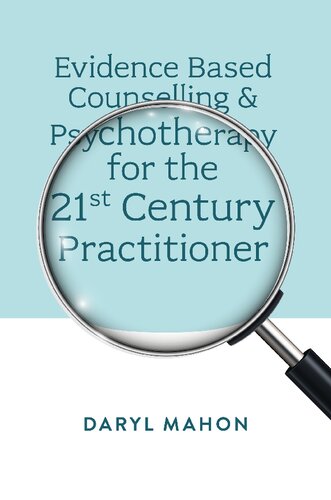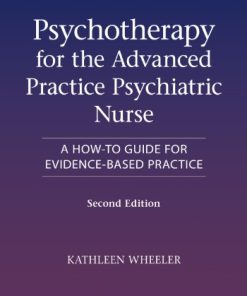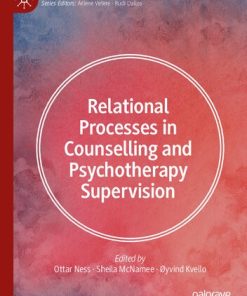(Ebook PDF) Evidence Based Counselling Psychotherapy for the 21st Century Practitioner 1st edition by Daryl Mahon 180455734X 9781804557341 full chapters
$50.00 Original price was: $50.00.$25.00Current price is: $25.00.
Evidence Based Counselling & Psychotherapy for the 21st Century Practitioner 1st edition by Daryl Mahon – Ebook PDF Instant Download/DeliveryISBN: 180455734X, 9781804557341
Full dowload Evidence Based Counselling & Psychotherapy for the 21st Century Practitioner 1st edition after payment.

Product details:
ISBN-10 : 180455734X
ISBN-13 : 9781804557341
Author: Daryl Mahon
Years of experience, level of qualification, modality delivered, supervision, personal therapy, and continuing professional development are not predictive of client outcomes in psychotherapy. Further, the outcomes of psychotherapy have not improved in over 40 years, despite the proliferation of new therapy modalities. Evidence Based Counselling & Psychotherapy for the 21st Century Practitioner answers how counselling and psychotherapy can be operationalised in the 21st century, dispelling long-held beliefs about how psychotherapy works. Discussing evidence-based practice in its various forms, the chapters provide an analysis of research used and the debate around the effectiveness of specific therapies, commonalities across therapies and the many evidence-based relationship variables that are said to contribute to effective psychotherapy. Client factors and the use of technology, deliberate practice, supervision, and a simulated client case demonstrate the application of the methods and ideas reviewed. Whether a novice psychotherapy trainee or a seasoned practitioner or supervisor, Evidence Based Counselling & Psychotherapy for the 21st Century Practitioner illustrates what an effective 21st century practitioner needs to know, do, and reflect on to improve the effectiveness of their psychotherapeutic work and client outcomes – of interest across the allied health and social care sectors where counselling and therapy interventions are used.
Evidence Based Counselling & Psychotherapy for the 21st Century Practitioner 1st Table of contents:
Part 1. Setting the Scene for Evidence Based Practice
Chapter 1. Empirically Supported Treatments: A Brief History
Abstract
Chapter Learning Outcomes
Introduction
Emerging Research
Specific Ingredients
The Road to ESTs
Empirically Supported Treatments
Conclusion
References
Chapter 2. Evidence Based Practice: An Overview
Abstract
Chapter Learning Outcomes
Introduction
Evidence Based Guidelines
Best Available Research Evidence
Clinical Expertise
Client Characteristics, Culture, and Preferences
Conclusion
References
Chapter 3. The Common Factors in Therapy
Abstract
Chapter Learning Outcomes
Introduction
Support for the Dodo Verdict
Common Factor Models
Client/Life Factors
Therapeutic Alliance
Feedback Effects
Model/Technique Specific Effects
Model/Technique General Effects
Therapist Effects
Contextual Common Factors
Impact of Contextual Common Factors
Conclusion
References
Part 2. Evidence Based Relationships & Responsiveness
Chapter 4. Evidence based Relationships 1: Therapeutic Alliance, Goals and Collaboration, Alliance Rupture–Repair, and Feedback-informed Care
Abstract
Chapter Learning Outcomes
Introduction
Goals Consensus and Collaboration
Impact of Goal Consensus and Collaboration on Outcomes
Therapeutic Alliance
Impact of Alliance on Outcomes
Alliance Rupture–Repair
Impact of Alliance Rupture–Repair on Outcome
Impact of Alliance Rupture–Repair Training on Outcome
Feedback-informed Care
Impact of Using Feedback on Outcomes
Conclusion
References
Chapter 5. Evidence based Relationships 2: Treatment Credibility and Outcome Expectancy
Abstract
Chapter Learning Outcomes
Introduction
Outcome Expectancy
Impact of OE on Therapy Outcomes
Treatment Credibility
Impact of TC on Outcome
Conclusion
References
Chapter 6. Evidence based Relationships 3: Emotional Expression, Counter-transference, Self-disclosure, and Immediacy
Abstract
Chapter Learning Outcomes
Introduction
Emotional Expression
Impact of Emotional Expression on Outcomes
TSD and Im
Impact of TSD and Im on Outcomes
Managing CT
Impact of CT on Outcomes
Conclusion
References
Chapter 7. Evidence based Relationships 4: Empathy, Congruence, Unconditional Positive Regard, and Real Relationship
Abstract
Chapter Learning Outcomes
Introduction
Empathy
Levels of Empathy
Impact of Empathy on Outcomes
Unconditional Positive Regard
Impact of Unconditional Positive Regard on Outcomes
Congruence
Impact of Congruence on Outcomes
The Real Relationship
Impact of the Real Relationship on Outcomes
Conclusion
References
Chapter 8. Evidence based Responsiveness 1: Client Factors
Abstract
Chapter Learning Outcomes
Introduction
Stages of Change
Impact of Stages of Change on Outcomes
Reactance Level
Impact of Reactance on Outcomes
Coping Style
Impact of Coping Style on Outcomes
Attachment Style
Client Preferences
Impact of Client Preference on Outcomes
Conclusion
References
Chapter 9. Evidence based Responsiveness 2: Multicultural Considerations
Abstract
Chapter Learning Outcomes
Introduction
Multicultural Competency
Clinical Example
Cultural Adaptations Research
Some Notable Cultural Adaptations
Religion/Spirituality
LGBTQ+
Gender
Intersectionality
Clinical Example
Microaggression
Clinical Example
Multicultural Orientation
Multicultural Alliance Rupture–Repair
Conclusion
References
Part 3. Innovations for 21st Century Psychotherapy: Practice, Supervision & Training
Chapter 10. Information Technology and Behavioural Healthcare in the 21st Century
Abstract
Chapter Learning Outcomes
Introduction
Turn of the Century Zeitgeist
Revolution in Models of Understanding
Clinical Information Systems
Where’s the Variance?
What About the Individual Practitioner?
What About the Medications?
Measurement and Feedback to Improve Outcomes
Is Client Data a Better Predictor of Outcome than the Clinician’s judgement?
Measurement 2.0 and the ACORN Collaboration
ACORN-generated Research
Emerging Technologies for Delivering Behavioural Healthcare
Conclusion
References
Chapter 11. Deliberate Practice for Enhancing Skill Development in 21st Century Psychotherapy
Abstract
Chapter Learning Outcomes
Introduction
Therapist Training
Individual Therapist Effects
Deliberate Practice
What DP Is, and Is Not
Where to Direct DP Efforts
Conclusion
References
Chapter 12. Enhancing Supervision Through the Use of Data
Abstract
Chapter Learning Outcomes
Introduction
Impact of Supervision on Outcomes
Using Feedback Data in Supervision
Skillset and Knowledge Base for the Supervisor
Using Data to Support DP
Cultivating an Attitude of Humility, Curiosity, and the Search for Improvement
Using Feedback to Improve Supervision
Conclusion
References
Chapter 13. Simulated Psychotherapy Case Study for the 21st Century Practitioner and Supervisor
Abstract
Chapter Learning Outcomes
Background to Case
Initial Assessment
Comments
Comments
Comment
Session 2
Comments
Comments
Comments
Comment
Comments
Comments
Comments
Comments
Supervision and DP
Comments
Comments
DP Framework
People also search for Evidence Based Counselling & Psychotherapy for the 21st Century Practitioner 1st:
evidence based practice in counselling and psychotherapy
what is evidence based psychotherapy
evidence based counseling techniques
evidence based counseling practices
evidence based counseling
You may also like…
Education Studies & Teaching - Education - General & Miscellaneous
Uncategorized
The Evidence Based Practitioner Applying Research to Meet Client Needs 1st Edition, (Ebook PDF)
Psychology - Psychotherapy
Psychotherapy Relationships That Work: Volume 1: Evidence-Based Therapist Contributions 1st Edition
Politics & Philosophy - Social Sciences
Earth Sciences - The Environment
Uncategorized
Counseling Ethics for the 21st Century: A Case-Based Guide to Virtuous Practice – Ebook PDF Version
Psychology - Psychotherapy
Psychology - Psychotherapy
Relational Processes in Counselling and Psychotherapy Supervision 1st Edition











